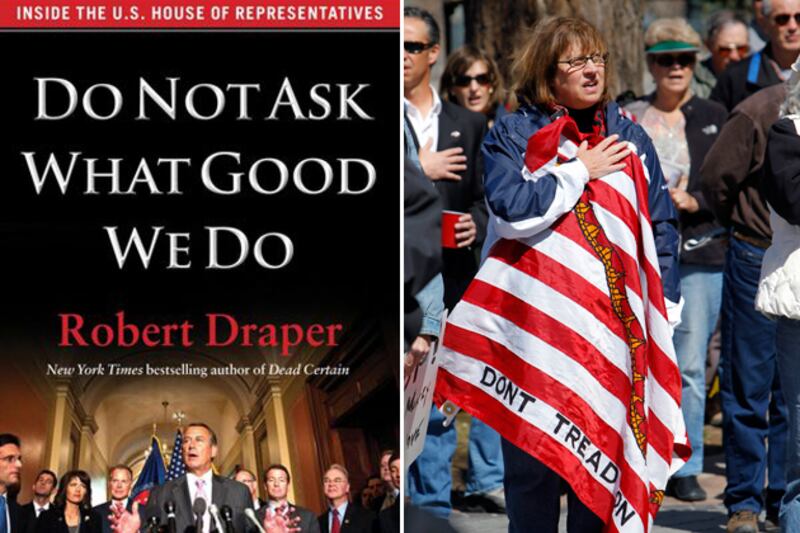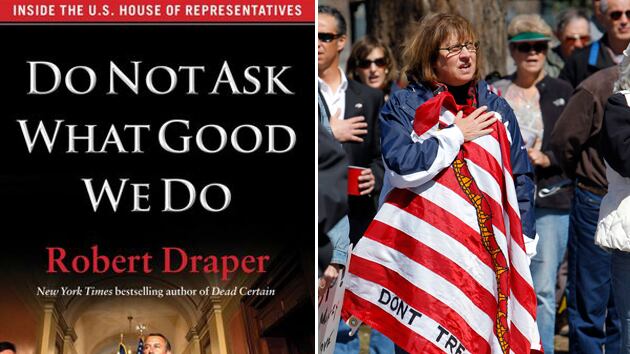“Get your ass in line”: there are a lot of quotable zingers in Robert Draper’s Do Not Ask What Good We Do: Inside the U.S. House of Representatives, but that withering command, issued by Speaker of the House John Boehner to his hardline Republican colleagues who refused to increase the debt ceiling last summer, expresses in five words the tension Boehner and the rest of the nation felt wondering if America would finally run out of money.
Do Not Ask What Good We Do accomplishes in 300 pages what 300 hours of hectoring cable news hosts cannot. A kaleidoscopic, humanizing portrait of the unruly 112th Congress—the one presided over by Boehner and monopolized, at least in the media, by the scrappy citizen-politicians uneasily yoked together as the Tea Party movement—Do Not Ask What Good We Do is also irresistible reading for people who perceive that the Tea Party invasion of Washington can’t possibly have been as orderly as Boehner wanted it to publicly appear (witness Draper’s memorable observation that the Democrats were in denial, wanting to think “that this whole program-slashing Republican orgy was Boehner’s way of indulging the freshmen until the grown-ups declared an end to playtime and tucked them into bed.”)
For a book so current, its final pages document events in the House that occurred just three months ago, Do Not Ask What Good We Do takes its cue (and title) from a bitter moment very long ago. “Do not ask what good we do: that is not a fair question, in these days of faction,” U.S. Representative Fisher Ames wrote in 1796, after concluding that four terms in the House was plenty. Fed up with congressional partisanship, Ames served his last term, threw in the towel and, presumably, hired the quickest mode of dispatch the late18th century could offer to his home in Massachusetts.
Maybe it’s comforting to know that the acrid politics of the 112th Congress have a precedence in the bickering that took place some two centuries ago. Or maybe not: many Americans are fed up with the adherence to ideology that trumps compromise in modern-day Washington. And despite minute-by-minute political updates in the news, there seems to be a vast confusion in our country about why Congress has failed to pass much meaningful legislation.

Draper’s peek-behind-the-curtain portraits of members of Congress hint at why the House is so stalled. The revelations Draper, a contributing writer for The New York Times Magazine, unearths include the infighting among Boehner and his deputie,s such as Eric Cantor; the internecine battles among Tea Party freshmen and their colleagues who are just as new to the House but already fed-up with the Tea Party’s refusal to compromise; and the lengthy behind-the-scenes negotiating the White House attempted in the effort to raise the debt ceiling. For all of Boehner’s understandable public assertions that the freshmen were in line, Do Not Ask What Good We Do proves how much time Boehner had to spend handling the freshmen who, like Idaho Republican Raul Labrador, believed the very institution they had recently joined “needed a thorough delousing.”
Draper profiles firebrands like Florida’s Allen West, a former Army lieutenant colonel who attempts to induce his draconian brand of military discipline on America’s finances and security apparatus. West is also the only Republican member of the Congressional Black Caucus. West comes across as someone whose mouth gets him in trouble (he recently nabbed coverage for labeling 81 of his House colleagues communists, and then got more coverage for refusing to back down from the accusation); his hand-wringing paranoia would have more bite if it weren’t so nostalgic. But in Draper’s reporting, he becomes a surprisingly nuanced person who isn’t afraid to defy the more conservative elements of his base (including a vote clearing the way for that Republican whipping-horse, the Environmental Protection Agency, to clean Florida’s waterways after farmers in his district encouraged him to vote that way).
Draper also focuses on Democrats like John Dingell, the 29-term “dean of the House” from Michigan who likes to sprout rural aphorisms known on Capitol Hill as Dingellisms (like believing that the Tea Party freshmen are as useful as “side pockets on a cow”). Avuncular but also with a talent for “epic pugnacity,” Dingell appeared to be the only person on Capitol Hill unaware that Minority Leader Nancy Pelosi was out to replace him as the chairman of the powerful Energy and Commerce Committee with Henry Waxman, a colleague more obedient to Pelosi, who appears to prize loyalty.
Political coverage increasingly prizes the horse race of politics—the who-dissed-whom daily score card—and fewer writers convey politicians as human beings rather than the constructed narrative campaign managers want them to depict. Draper’s “world view is much better equipped to cover Washington than the correspondents steeped in the Washington conversation,” his fellow New York Times writer Mark Leibovich says. “It’s not to denigrate the daily journalism that goes on here and it would be hypocritical for me to criticize the horse race—I’m susceptible to it—but I do think Robert is very, very good at keeping a wide vision.”
Draper hasn’t always been a political writer; he’s lived in Washington for only the last seven years. “I approach topics such as this one with an outsider’s perspective and an outsider’s fascination,” he says (full disclosure: Draper will appear this fall at the Texas Book Festival, where I’m the program director). The author of 2007‘s Dead Certain: The Presidency of George W. Bush, Draper convinced his publisher to let him put aside a book under contract he was writing about American race relations in the post-civil-rights era so he could spend a year writing about the House. He interviewed 200 people for the book and each day the House was in session spent at the House, listening and talking to people. He says he interviewed some members of the House as many as 25 times. “I really came to like them as people and to respect the fact that they have a belief system, whether it’s mine or not,” Draper says.
In 2010, when Draper was reporting for the Times Magazine what may be the most insightful article about the mechanics and philosophy of Sarah Palin’s political operation, he interviewed political researcher Andrew Davis, one of Palin’s political advisers. They met at a diner in midtown Manhattan. “I was very nervous,” Davis recalls. “I don’t talk to reporters very often and ... we just hit it off. I didn’t feel threatened or that I was going to get caught in anything. And he was very fair in the story he wrote.”
It’s clearly the Tea Party freshmen who interest Draper the most in Do Not Ask What Good We Do. “I thought it would be really interesting not just as a work of political journalism but as a human enterprise to see these self-styled Mr. Smiths come to Washington with the belief that things needed to be changed and to see how they would fare not only in the Capitol city but in a body of 435 individuals who represent all these different swaths of America,” he says.
In other words, Draper isn’t that interested in power. It’s the hidden side of power, the uncertainty of the people who have it, the aspect politicians try to keep secret, that he’s after. Draper mentions South Carolina Rep. Jeff Duncan, someone he profiles in the book, the House member Heritage Action for America rated the most conservative of all in 2011. Duncan struggled to make himself heard during the 112th Congress. “ ‘How do I make a difference when no one even knows who I am?’ is a far more interesting question,” Draper says, “than ‘How do I use all the levers of power to maintain my power forever more?’”






